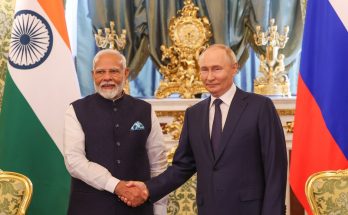
The G20 presidency offers India a unique opportunity to spur its economic growth and shape the global agenda to advance the interests of the Global South. The burgeoning India-US partnership will play a critical role in actualising these goals, says Mukesh Aghi.
By Mukesh Aghi
Euphoria grips India in the wake of the historic moon landing of Chandrayaan-3, a milestone moment for India’s space program and a triumph for the Indian Space Research Organization (ISRO). With the successful moon landing, India not only joins the exclusive club of just three other nations, the United States, Russia, and China, to have accomplished this extraordinary feat, but also writes its name into history as being the first to land on the South Pole of the moon.
Against this spectacular backdrop, the focus shifts back to the ground in India, as the nation prepares for the G20 Summit 2023.
G20 Vision
Prime Minister Narendra Modi has articulated India’s vision, in that this G20 Summit will espouse the importance of equitable growth and a shared future for all. This is best captured by this year’s theme, “Vasudhaiva Kutumbhakam”, or “One Earth, One Family, One Future”.
Prime Minister Modi has emphasized that India’s presidency comes at a time of global economic and geopolitical headwinds and that the summit will in particular voice the concerns of the Global South. The Prime Minister has recently returned from Johannesburg, South Africa from the BRICS Summit and has proposed the African Union to become a permanent member of the G20.
Advantage And Challenge
India’s place on the global stage is now established. As the world’s most populous country with one of the fastest-growing economies, we serve as a key bridge between the emerging economies and the Group of 7 (G7) bloc. India, apart from advocating a more egalitarian representation for the Global South, is also looked upon as a key arbiter in the tensions between Russia and the West with the ongoing conflict in Ukraine, a conflict which will preclude President Vladimir Putin from sharing the dais with President Joe Biden.
With the G20 presidency, India has the herculean task of bridging the trust deficit that lies between Moscow and the West, as tensions in Europe exacerbate the economic crisis of food and energy price volatility. Previous G20 meetings since December 2022, when India took over the presidency from Indonesia, failed to realise a joint communique between the member nations as the deadlock ensued. Unfortunately, consensus and a solution continue to elude.
The G20 meetings so far have deliberated on rising debt, sustainable development, climate action, and food security, among other issues that affect low- to middle-income countries.
While President Putin will skip the summit and deputize his Foreign Minister Sergey Lavrov to be Moscow’s voice and articulate their concerns, President Biden will visit New Delhi for the first time as the President. The White House has stated that President Biden will address a broad range of economic issues, including the ongoing conflict between Russia and Ukraine.
Bilateral Ties in Multilateral Fora
President Biden and Prime Minister Modi will meet once again after a historic state visit by Prime Minister Modi to the United States in June, which reaffirmed the strength of the strategic partnership and elevated it to new heights. Washington and New Delhi inked crucial deals in critical and emerging technology, with the jet engines deal and quantum computing to semiconductor investments, and from drone technology and artificial intelligence to underwater cables. With ISRO’s recent success, there will be many more opportunities for collaboration in space between NASA and ISRO.
As summer fades to fall, a reminder of the hottest months in both the subcontinent and the United States, the threat of climate change means a conscientious shift from fossil fuels to a clean energy economy as both New Delhi and Washington reaffirm their commitment in this sector. The people-to-people ties remain the bedrock of this relationship as education and cultural links are further cemented.
Economic Vision

The G20 Summit 2023, to be held in New Delhi on September 9-10, is where President Biden, Prime Minister Modi, and other heads of government will come together to tackle the pressing problems of the decade. The core mandate of the G20 remains to promote economic growth and development. Prime Minister Modi has made it clear that these goals cannot be achieved without addressing the concerns and achieving a consensus in the Global South.
A slew of problems from tackling climate change to reforming multilateral development banks and multilateral institutions such as the World Bank and International Monetary Fund, will require a consensus-building approach. The focus on development banks is critical as infrastructure investments and development remain a key priority, especially as the security situation worsens in the Sub-Saharan region.
The geopolitics of the South China Sea and the territorial disputes have brought Tokyo, Canberra, Washington, and New Delhi together in the Indo-Pacific Quad, but the G20 will bring to the fore the priority for maritime security and economic fishing lanes. The priority in the Indo-Pacific is twofold: economic growth and investments in emerging economies and adhering to and upholding a rules-based international order.
Key priorities from the Business20 (B20) summit that will overlap with the G20 discussions will be along the lines of rebuilding resilient supply chains, a focus on the digital economy as Prime Minister Modi has made India’s digital transformation a key priority for the G20 Summit, addressing the debt stress plaguing emerging economies, and collectively finding solutions to climate goals, which shows that no part of the world is insulated from this threat.
Elevating Manufacturing
As India sets its sights on becoming a 5 trillion dollar economy and is expected to grow from the fifth largest to the third largest economy, the imperative remains to generate 12-15 million jobs annually in order to accommodate the influx of new entrants into the workforce.
While India’s information technology prowess is well established, the burden cannot be shouldered solely by the services sector. There is a concerted effort to grow India’s manufacturing economy, especially in high-tech manufacturing. This sector is scalable and will provide mass employment for semi-skilled laborers, fostering essential economic mobility, and contributing to individual states’ GDP, thereby underscoring the economic competitiveness among different states within the federal structure.
Semiconductors: The New Oil
The focus is on semiconductors in the critical and emerging technology domain as AI dominance enters the geopolitical fray. Companies need to look at a “China-plus-one” model in a dual effort to rebuild supply chains and avoid bottlenecks and supply chain vulnerability after the Covid-19 pandemic of 2020. This has accentuated the necessity to diversify manufacturing locations and explore alternative markets for advanced products.
India stands out in this regard. To bridge the deficit with Beijing, the government in New Delhi is focused on initiatives like “Make in India” and “Production Lined Incentives”. The recent policy outcomes from the state visit in June show that manufacturing is vital to both American and Indian economies, and both New Delhi and Washington continue to share geopolitical and economic alignment in an era of cooperative manufacturing.

Apple CEO Tim Cook’s visit to inaugurate Apple’s maiden retail store in India holds profound significance and reinforces the tech giant’s confidence in India’s ecosystem and extends an invitation to fellow Fortune 250 enterprises to participate in the “Make In India” initiative. It’s also a belief in India’s supply chain capabilities, and adds confidence as a prime destination for American manufacturers, particularly within the expansive consumer electronics domain that aligns with India’s huge consumer market.
A newly privatized Air India meant augmented purchasing power to procure additional aircraft from both Boeing and Airbus. The agreement with Boeing not only bolstered commercial ties between the United States and India but was also hailed as a “historic agreement” by President Biden and Prime Minister Modi. This accord resonated as a pivotal catalyst for the American manufacturing sector, a critical point of discussion as America heads to the polls in 2024.
From the sea to the stars, in securing a free and open Indo-Pacific to the success of its space mission, to energizing a clean energy economy with the electrification of vehicles and the ubiquity of digital payments and the growth of the digital economy, the G20 Summit and India’s presidency is a harbinger for the Indian economy and growth ahead.
(Mukesh Aghi is the President & Chief Executive Officer of the US-India Strategic Partnership Forum. Dr. Aghi has extensive experience working with business and government leaders in the U.S. and India to promote trade and strengthen ties between the two countries.)
This article is included in the Summit Edition of India and the World magazine-journal, focused on India’s G20 presidency. It has been published to mark the September 9-10 G20 summit in New Delhi. To subcribe or buy, write to: indiawritesgroup@gmail.com
Mukesh Aghi (1)
Author Profile
- India Writes Network (www.indiawrites.org) is an emerging think tank and a media-publishing company focused on international affairs & the India Story. Centre for Global India Insights is the research arm of India Writes Network. To subscribe to India and the World, write to editor@indiawrites.org. A venture of TGII Media Private Limited, a leading media, publishing and consultancy company, IWN has carved a niche for balanced and exhaustive reporting and analysis of international affairs. Eminent personalities, politicians, diplomats, authors, strategy gurus and news-makers have contributed to India Writes Network, as also “India and the World,” a magazine focused on global affairs.
Latest entries
 In ConversationJuly 26, 2024India-Italy defence collaboration can extend to third countries: Anil Wadhwa
In ConversationJuly 26, 2024India-Italy defence collaboration can extend to third countries: Anil Wadhwa In ConversationJuly 23, 2024Italy views India as a key partner in Indo-Pacific: Vani Rao
In ConversationJuly 23, 2024Italy views India as a key partner in Indo-Pacific: Vani Rao DiplomacyJune 29, 2024First BRICS unveils a roadmap for boosting tourism among emerging economies
DiplomacyJune 29, 2024First BRICS unveils a roadmap for boosting tourism among emerging economies India and the WorldJune 11, 2024On Day 1, Jaishankar focuses on resolving standoff with China
India and the WorldJune 11, 2024On Day 1, Jaishankar focuses on resolving standoff with China






